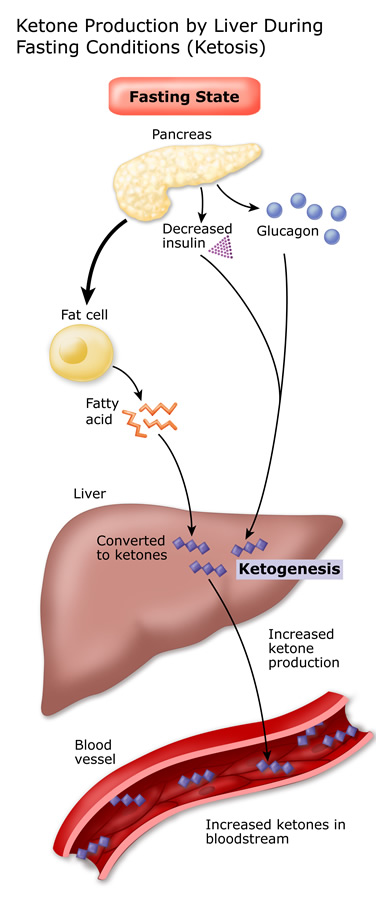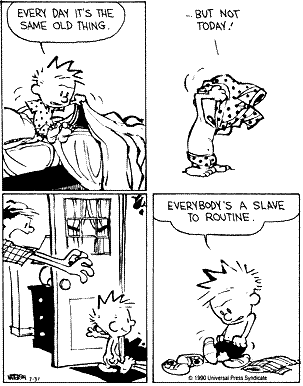So what exactly is ketogenic dieting? Well, it's an interesting approach to dieting in which you try to stimulate your body to release organic compounds called ketones, which are used by the body to breakdown fat, and are released during a biological process called ketogensis. Ketones have the organic structure of a double-bonded carbon atom to an oxygen atom, with that same carbon atom having two other organic structures attached to it (denoted by the "R's" in the figure below).
Source: wikimedia
Your body likes to run on carbs as its main source of energy. That's why you crave them so much. They are efficient sources of energy and a lot easier to break down depending on the carbs you eat. When you have an adequate amount of carbs, or an overabundance of carbs, floating throughout your body, your pancreas releases insulin. Insulin is a VERY powerful hormone that can cause major changes in your physique. Its main purpose is to store glycogen, amino acids, and other things into your muscle cells (depending on the type of carb), while storing the excess in your body as fat.
When your body is low on carbs, from fasting or simply eating a very small amount of carbs, your body starts to release ketones through ketogenesis so that it can break down fat for energy due to a lack of carbs. This is beneficial from a physique transformation standpoint because, well.......you're breaking down unwanted fat. While insulin is released by the pancreas, ketones are produced and released mainly by the mitochondira of the liver cells.
Source: fgamedia.org
Theories and Protocol to Keto-Dieting*Consume an extremely low amount of carbs (like under 50-100g of carbs) on days you don't work out / most of the week. This means that most of your carbs will only really come from the residual carbs eaten through your protein and fat sources.
*Consume about the same amount of protein that you would on most other bodybuilding meal-plan protocols, i.e. about 85%-100% of your bodyweight in grams of protein.
*Consume an INSANE amount of fat. Like well over 100-200g of fat. In doing a quick web-search on keto-dieting protocol, I've found it to typically be about 60% of your daily calories coming from fat. (That's from non-scientifically credible sources though...so do a thorough search to come to your own conclusion).
*From having so much fat readily available, and almost non-existent carbs, your body will stop releasing insulin and start releasing ketones.
*By stimulating ketone relase, your body has a lot of ketones floating throughout the body for which to start breaking down fat with, resulting in a leaner body over time should one continue this dietary protocol.
Source: ucsf.edu
So keto-dieting involves eating adequate protein, low to no carbs, and LOTS of dietary fat. The fat comes from foods that are high in fats like certain dairy products, non-lean meats like bacon, super dark chocolate, nuts, etc. By eating such a high level of fat, it is thought that your body will release ketones to dissolve fat.
I think it's important to note that fats do not make you fat. Consuming more calories than your body uses throughout the day results in fat, whether that be through carbs, proteins, or fats. Fats are just more calorie-dense and therefore easier to step over your caloric maintenance calories for the day. 100 grams of carbs and protein is roughly equal to 400 calories while 100 grams of fat is equal to about 900 calories. So long as you are within your maintenance calories or eating under that, you WILL lose weight.
But back to the topic at hand. How do you know if you are in a state of ketosis? Well, you can attain over the counter urine tests to see if your body is in a state of ketosis, since ketones are released in the urine through its effects on biological structures and processes. They use a color-coded scale to indicate just how intensely your body is in a state of ketosis. However, I've heard that these tests are a good ballpark measure, but aren't exactly super accurate or reliable.
An example of a keto test strip test
Source: wikimedia
As I just stated, I've personally tried keto-dieting. I can say that my body did in fact seem to react in a way that was in line with what others were experiencing while on the keto protocol. However, I can't say that I stayed on the diet long enough to tell any of you reading this post as to whether or not it is highly effective. Why didn't I stay on it for a long period of time? Well, because my body was reacting to it like you would expect it to.........like it was deprived of all readily available energy.
I literally had close to no energy during my workouts, and every day that I worked out seemed to drag on endlessly. My intensity fell and, since my carbs were very low, I had no pump and my muscles were consistently flat from the lack of glycogen and fluid retention. Since my workouts suffered, and my aesthetics were thrown off, I decided to go another route with my nutrition. You might find that a ketogenic diet is the right diet for you and your lifestyle though!
And there you have it. I believe that keto-dieting has some interesting theories behind it that appear at least on the surface to be valid. I think I would recommend this diet for those who are interested solely in losing weight, but not so much for those trying to maintain muscle size and bodybuild. Give it a shot, and let me know what you think!
-Jtrain
------------------------------------------------------------------------------------------------------------------------------------------*Have a question about natural bodybuilding / fitness / nutrition / stress? Need some advice? Email me at jtrainfitness@gmail.com and I will answer it on this blog! Be sure to enter your email to receive alerts for when the next blog post has come out, and be sure to tell your friends about this blog! Follow me on twitter @jtrainfitness and tell your friends to do the same!*
------------------------------------------------------------------------------------------------------------------------------------------































